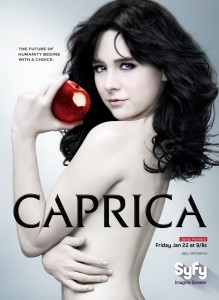 Caprica, the new science fiction television series on the SyFy Channel, recently debuted, and it continues to generate positive commentary. The series is a prequel to the successful Battlestar Galactica series from the same network, a reworking of the campy 1970s series.
Caprica, the new science fiction television series on the SyFy Channel, recently debuted, and it continues to generate positive commentary. The series is a prequel to the successful Battlestar Galactica series from the same network, a reworking of the campy 1970s series.
Religion Dispatches assembled a group of scholars who shared their thoughts on Caprica as part of their ongoing reflection on the series. The first installment is titled “Capricology: Television, Tech, and the Sacred.” Below are comments from one of the participants, Henry Jenkins. He writes in part:
Battlestar Galactica feels much more like a science fiction series than this one — if only because it follows the space opera conventions so fully — even as it drew so much inspiration from our own culture. Caprica by contrast creates a world which looks and feels very much like our present society. Did any one notice the battered Microwave Oven in the Adama kitchen which looks, if anything, out of date even today? They have stripped away the science fiction trappings as much as possible to give this story greater immediacy. The producers have talked about appealing to folks who don’t normally like SF. But what that does is make the few explicitly science fiction elements stand out that much more — the recurring focus on new media (from the virtual world to the digital paper), AI/Robotics, and alternative religious/cultural institutions.
It is striking that the series in many ways is treating polytheism as the norm in the culture while depicting monotheism as the radical other. It’s a safe bet that more monotheists are watching the series than polytheists. So, there is a certain kind of estrangement which must take place when the film consistently links monotheism with radical practices and even terrorism. In the past, we’ve seen the Cylons consistently depicted as monotheistic, but the series worked over time to break down the walls between man and machine, suggesting common identities, experiences, emotions, beliefs, and desires between them, because they are so implicated in each other’s histories.
Caprica promises to provide not only good drama through science fiction, but also continued food for cultural, social, and religious thought as well. The first episode can be viewed here.





There are no responses yet